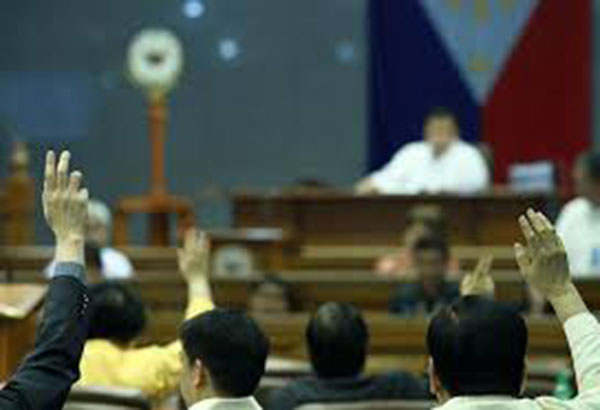TODAY Lawmakers pass 14 laws this year

Lawmakers passed this year at least 14 bills of national application
MANILA, Philippines – Lawmakers passed this year at least 14 bills of national application, which President Aquino signed into law.
According to a tally made by the House of Representatives, 2015 is the second most productive year of the outgoing 16th Congress after 2013, when the legislature approved 20 national bills that became law.
Twelve laws were enacted in 2014, 11 in 2012 and four in 2011.
The most recent bill passed by Congress that became law enhances transparency in the management and accounting of tax incentives. President Aquino signed it last Dec. 9.
Last month, the President affixed his signature on four measures: those that modernize the Philippine Atmospheric, Geophysical and Astronomical Services Administration, strengthen non-government organizations engaged in micro-finance operations for the poor, prevent the proliferation of weapons of mass destruction, and amend Presidential Decree 986, otherwise known as the Probation Law of 1976.
The Unifast Law, which consolidates and streamlines the administration of all student financial assistance programs, was signed on Oct. 15.
The other statutes enacted this year are the Fair Competition Act, the Cabotage Law, Open High School System Act, the measure that provides for the safety of children aboard motorcycles, the creation of two additional divisions in the Sandiganbayan, the repeal of the crime of premature marriage and the tax exemption for bonuses of up to P82,000.
Last year, the 12 bills that Aquino signed included those that require telecommunications companies to provide free mobile alerts in case of disasters, strengthen the anti-drug campaign, allow the entry of foreign banks, mandate graphic health warnings on tobacco products, give scholarships to the top 10 graduates of public high schools and the Lemon Law.
Among the laws enacted in 2013 were the Kasambahay Act, amendments to the Anti-Money Laundering Law, mandatory biometrics voter registration, K-to-12, Philippine Standard Time Act, Anti-Drunk Driving Act, Comprehensive Law on Firearms and Ammunition, allowing the infusion of foreign capital in rural banks, Anti-Bullying Act and reparation of human rights victims during the Marcos regime.
The controversial Responsible Parenthood and Reproductive Health Bill and the sin tax reform measure became statutes in 2012.
Collections from the so-called sin products like tobacco and alcohol are funding the administration’s universal health insurance coverage program.
Also signed in 2012 were the Data Privacy Act, People’s Survival Fund Act, Cybercrime Prevention Act, the modernization program of the Armed Forces of the Philippines, Kindergarten Education Act and the bill defining the crime of financing of terrorism.
The four measures that became law in 2011 sought to promote financial viability and fiscal discipline in state corporations, allow the employment of night workers, extend the electricity lifeline rate for poor households and provide for the synchronization of elections in the Autonomous Region in Muslim Mindanao.
According to a tally made by the House of Representatives, 2015 is the second most productive year of the outgoing 16th Congress after 2013, when the legislature approved 20 national bills that became law.
Twelve laws were enacted in 2014, 11 in 2012 and four in 2011.
The most recent bill passed by Congress that became law enhances transparency in the management and accounting of tax incentives. President Aquino signed it last Dec. 9.
Last month, the President affixed his signature on four measures: those that modernize the Philippine Atmospheric, Geophysical and Astronomical Services Administration, strengthen non-government organizations engaged in micro-finance operations for the poor, prevent the proliferation of weapons of mass destruction, and amend Presidential Decree 986, otherwise known as the Probation Law of 1976.
The Unifast Law, which consolidates and streamlines the administration of all student financial assistance programs, was signed on Oct. 15.
Headlines ( Article MRec ), pagematch: 1, sectionmatch: 1
Last year, the 12 bills that Aquino signed included those that require telecommunications companies to provide free mobile alerts in case of disasters, strengthen the anti-drug campaign, allow the entry of foreign banks, mandate graphic health warnings on tobacco products, give scholarships to the top 10 graduates of public high schools and the Lemon Law.
Among the laws enacted in 2013 were the Kasambahay Act, amendments to the Anti-Money Laundering Law, mandatory biometrics voter registration, K-to-12, Philippine Standard Time Act, Anti-Drunk Driving Act, Comprehensive Law on Firearms and Ammunition, allowing the infusion of foreign capital in rural banks, Anti-Bullying Act and reparation of human rights victims during the Marcos regime.
The controversial Responsible Parenthood and Reproductive Health Bill and the sin tax reform measure became statutes in 2012.
Collections from the so-called sin products like tobacco and alcohol are funding the administration’s universal health insurance coverage program.
Also signed in 2012 were the Data Privacy Act, People’s Survival Fund Act, Cybercrime Prevention Act, the modernization program of the Armed Forces of the Philippines, Kindergarten Education Act and the bill defining the crime of financing of terrorism.
The four measures that became law in 2011 sought to promote financial viability and fiscal discipline in state corporations, allow the employment of night workers, extend the electricity lifeline rate for poor households and provide for the synchronization of elections in the Autonomous Region in Muslim Mindanao.










0 comments:
Mag-post ng isang Komento